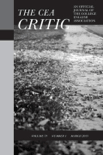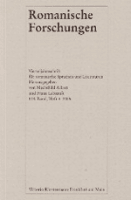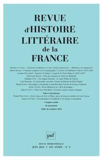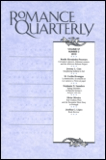
ROMANISTISCHE ZEITSCHRIFT FUR LITERATURGESCHICHTE-CAHIERS D HISTOIRE DES LITTERATURES ROMANES
Scope & Guideline
Advancing Scholarship in the Realm of Romance Literatures
Introduction
Aims and Scopes
- Interdisciplinary Literary Analysis:
The journal emphasizes the importance of interdisciplinary approaches, integrating insights from history, philosophy, and cultural studies to deepen the understanding of Romance literatures. - Historical Contextualization:
It consistently focuses on the historical development of Romance literatures, analyzing texts within their specific socio-political and cultural contexts. - Literary Theory and Criticism:
The journal contributes to literary theory by discussing various critical frameworks and methodologies applied to Romance texts, encouraging a diverse range of interpretative strategies. - Exploration of Lesser-Known Texts:
A unique contribution of the journal is its dedication to uncovering and analyzing lesser-known or forgotten works, thereby enriching the canon of Romance literature. - Cultural Memory and Representation:
The journal explores themes of cultural memory, identity, and representation in literature, highlighting how these elements interact within the texts of Romance languages.
Trending and Emerging
- Postcolonial Perspectives:
There is an increasing focus on postcolonial themes, examining how Romance literatures engage with colonial histories and the complexities of identity in a globalized world. - Gender Studies and Feminist Critique:
Recent works emphasize gender dynamics, exploring the representation of women in literature and the contributions of female authors, reflecting a broader trend in literary criticism towards inclusivity and diversity. - Cultural Memory and Trauma:
A notable trend is the exploration of cultural memory and trauma, particularly in relation to historical events and their literary representations, which resonates with contemporary societal discussions. - Intermediality and Adaptation:
Emerging themes also include studies on intermediality, examining how literary texts interact with other forms of media such as film and visual arts, as well as adaptations of literary works. - Environmental Literature:
An increasing interest in environmental issues and their literary representations is evident, reflecting a growing concern for ecological themes within Romance literatures.
Declining or Waning
- Traditional Canonical Works:
There seems to be a declining focus on traditional canonical works of Romance literature, with fewer studies dedicated to well-trodden authors and texts, suggesting a shift towards exploring contemporary and diverse voices. - Formalist Approaches:
Formal literary analysis, which emphasizes structure and aesthetics, appears to be waning in favor of more contextually grounded and interdisciplinary approaches that prioritize socio-political implications. - Historical Biographies:
Less emphasis is placed on biographical studies of historical literary figures, indicating a move towards thematic and textual analyses rather than individual author-centric narratives.
Similar Journals

CEA CRITIC
Fostering scholarly dialogue in literary studies.CEA CRITIC, published by Johns Hopkins University Press, is a reputable journal that contributes significantly to the fields of Education, Literature, and Literary Theory. With an ISSN of 0007-8069 and E-ISSN of 2327-5898, the journal has been a vital platform for scholarly discourse since its inception in 2002, reinforcing its commitment to advancing knowledge and critical analysis in literature and education through to 2024. Though currently indicated in Q4 quartile rankings, CEA CRITIC welcomes submissions that challenge established norms and explore innovative perspectives, making it an essential resource for researchers, educators, and students alike. As an important outlet for original research and in-depth reviews, this journal strives to foster a vibrant academic community by offering insights that resonate both within and beyond the classroom. Engage with CEA CRITIC to share your scholarly work and contribute to this evolving dialogue in contemporary education and literary studies.

ROMANISCHE FORSCHUNGEN
Unveiling the Nuances of Romance LanguagesROMANISCHE FORSCHUNGEN, published by VITTORIO KLOSTERMANN GMBH, stands as a key scholarly journal in the fields of linguistics and literary studies, focusing particularly on Romance languages and literature. With an ISSN of 0035-8126 and an E-ISSN of 1864-0737, this journal is vital for researchers and scholars seeking to explore and advance their understanding of the nuances within Romance language studies. Operating from its base in Frankfurt am Main, Germany, ROMANISCHE FORSCHUNGEN features a robust publication history from 2002 to 2024. While currently categorized in Q4 within both Linguistics and Language and Literature and Literary Theory for 2023, the journal aims to cultivate a scholarly dialogue that bridges these disciplines, fostering an environment for innovative and critical inquiry. Although not an open-access journal, it serves as a crucial resource for professionals and students dedicated to Romance philology and comparative literature.

Etudes Romanes de Brno
Elevating Academic Excellence in the Romanesque FieldsEtudes Romanes de Brno, published by Masaryk University, Faculty of Arts, is a distinguished academic journal that has been contributing to the fields of Linguistics and Language as well as Literature and Literary Theory since its inception. With an ISSN of 1803-7399 and E-ISSN 2336-4416, this open-access journal has been a valuable resource for scholars since 2009, enhancing accessibility to a broad audience of researchers and students in the Czech Republic and beyond. The journal's impact is underscored by its categorization in the Q2 and Q3 quartiles for literature and linguistic studies as of 2023, reflecting its commitment to rigorous academic discourse. With Scopus rankings placing it in the 57th and 31st percentiles for its respective fields, it continues to attract high-quality submissions that explore contemporary issues in literary studies and language analysis. Etudes Romanes de Brno promises to remain an essential platform for the exchange of scholarly ideas, fostering growth and innovation in the humanities.

REVUE D HISTOIRE LITTERAIRE DE LA FRANCE
Illuminating the Path of French Literary ThoughtREVUE D'HISTOIRE LITTERAIRE DE LA FRANCE, published by Classiques Garnier, is a distinguished academic journal dedicated to the exploration and analysis of French literary history and theory. With an ISSN of 0035-2411 and an E-ISSN of 2105-2689, this journal serves as an essential resource for researchers, professionals, and students in the fields of literature and the humanities. Though it does not currently offer open access, its rigorous scholarship contributes significantly to the understanding of historical literary movements and their cultural contexts. Despite its discontinuation in Scopus after 2016, the journal has a notable academic pedigree, providing critical perspectives on literature from the past to the contemporary era. Situated at 6 Rue de la Sorbonne, Paris 75005, France, the journal aims to enrich the discourse surrounding literary theory and history, highlighting its enduring relevance in today's scholarly landscape.

ROMANCE QUARTERLY
Bridging Literature and Cultural InsightsROMANCE QUARTERLY is an esteemed journal published by Routledge Journals, Taylor & Francis Ltd, focusing on critical discussions and innovative research in the fields of Cultural Studies and Literature and Literary Theory. With its inception in 1986, this journal has diligently documented the evolving landscape of romance literature, making significant contributions through interdisciplinary approaches that resonate across literature and cultural scholarship. Holding a commendable position in academic rankings, it is classified in the second quartile for Literature and Literary Theory, and in the third quartile for Cultural Studies as of 2023, highlighting its relevance and impact within these domains. While it operates under a traditional access model, the required scholarly discourse and access to contemporary studies make it a crucial resource for researchers, educators, and students alike. ROMANCE QUARTERLY serves not merely as a platform for publishing but as a vibrant hub for the exploration and analysis of romance narratives, offering invaluable insights into their impact on cultural and societal constructs, surely a must-read for anyone passionate about these subjects.

Taller de Letras
Nurturing a Dialogue on Literary InnovationTaller de Letras is a renowned academic journal published by the Pontificia Universidad Católica de Chile, specifically from the Faculty of Letters. With an ISSN of 0716-0798, this journal holds a significant position in the field of Literature and Literary Theory, enjoying a commendable Q2 quartile ranking as of 2023. It operates under the auspices of a prestigious institution, promoting high-quality scholarly discourse within its scope, which spans a wide array of literary studies. Although the journal does not offer Open Access, its contributions are pivotal for researchers, professionals, and students seeking to enhance their understanding of contemporary literary trends and theories, establishing a critical dialogue within the literary community. With coverage extending through a converged lifespan from 2011 to 2024, Taller de Letras continues to be a valuable resource for those engaged in the vibrant fields of literature and criticism.

Novoe Literaturnoe Obozrenie
Cultivating Critical Perspectives in Cultural StudiesNovoe Literaturnoe Obozrenie, an esteemed publication dedicated to the realms of Cultural Studies and Literature and Literary Theory, serves as a vital resource for scholars and professionals alike. Published by NOVOE LITERATURNOE OBOZRENIE-NEW LITERARY OBSERVER in the Russian Federation, this journal provides critical insights and scholarly critiques that reflect the evolving landscape of literary discourse. With an established H-index and a focus on fostering academic inquiry, the journal has secured its place amidst contemporary scholarly discussions, indexed in Scopus with rankings that illustrate its commitment to quality despite a current presence in the lower quartiles. Novoe Literaturnoe Obozrenie is a non-open-access journal, encouraging a traditional yet scholarly approach to literary studies and remains an essential read for researchers, students, and professionals that seek to deepen their understanding of literature’s impact on culture and society. Publishing from 2016 until 2024, it continues to bridge theoretical frameworks with practical discourse, making significant contributions to the fields it encompasses.

PAMIETNIK LITERACKI
Cultivating Voices in Literary TheoryPAMIETNIK LITERACKI is a distinguished peer-reviewed journal dedicated to advancing the fields of Literature and Literary Theory, published by WYDAWNICTWO PAN, INST BADAN LITERACKICH PAN in Poland. With an ISSN of 0031-0514 and E-ISSN of 0031-0514, this journal has been operating under an Open Access model since 2012, ensuring wide accessibility and dissemination of scholarly work. The journal has undergone a journey through various categories, currently positioned in the Q4 quartile according to the 2023 category rankings in Literature and Literary Theory, with a Scopus rank of #1009/1106 placing it in the 8th percentile. PAMIETNIK LITERACKI serves as a critical platform for scholars, providing a venue for innovative research, discussions, and reviews that shape the literary discourse in Poland and beyond. For those passionate about literary studies, this journal represents a vital resource for both established researchers and emerging voices in the field.

Romanic Review
Bridging Cultures Through Critical ScholarshipThe Romanic Review, published by Duke University Press, stands as a significant scholarly platform in the field of Romance languages and literature. With its ISSN 0035-8118 and E-ISSN 2688-5220, this journal has been serving the academic community since its inception and will continue its contribution until 2024. Situated in the United States, it has carved out a vital niche in the Arts and Humanities, currently falling within the Q3 quartile as per the 2023 rankings. Although it operates under a traditional subscription model, its focus on disseminating critical and innovative research makes it an indispensable resource for scholars and students alike. The Romanic Review is dedicated to fostering academic discussions that bridge interdisciplinary gaps, making it a cornerstone reference for anyone engaged in the study of Romance cultures, linguistics, and literary studies.

NEUE RUNDSCHAU
Unveiling Innovative Perspectives in LiteratureNEUE RUNDSCHAU is a prominent journal published by S Fischer Verlag GmbH, specializing in the fields of literature and literary theory, as well as visual arts and performing arts. With its roots tracing back to its inception in 1969, this journal has evolved significantly, providing a platform for critical discourse and innovative scholarship in the arts and humanities. Although it experienced coverage changes, the journal remains a vital resource for researchers and academics, contributing to the rich dialogue surrounding cultural studies and artistic expression. Furthermore, while it is not available through open access, NEUE RUNDSCHAU offers essential insights into contemporary literary trends and artistic movements, ensuring its relevance and importance within the academic sphere. With Scopus rankings including a position in the 16th percentile for literature and literary theory, and a 10th percentile placement in cultural studies, the journal embodies a commitment to quality scholarly contributions, making it an invaluable asset for students, professionals, and researchers alike.